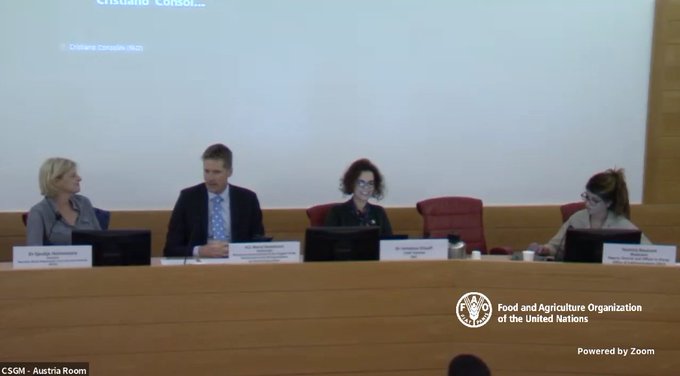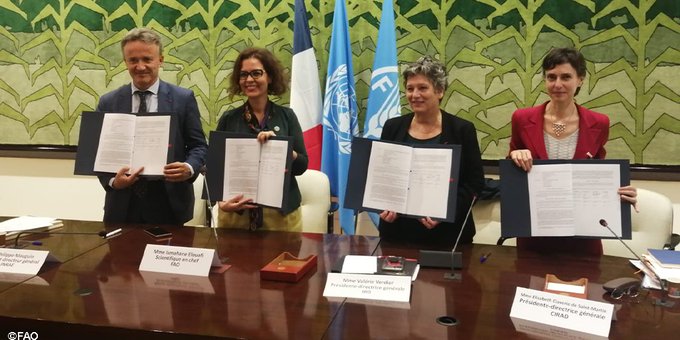The forum highlighted the centrality of science, technology and innovation for agrifood systems transformation.
DAY 1: Extracts of the programme
18/10 Science, Technology and Innovation (STI) for improving agricultural productivity and competitiveness in Africa
Organized by FAO Regional Office for Africa (FAO RAF)See the recording
FAO-WUR new priorities aligned with the 2021 Memorandum of Understanding
Opening statements
Ceremony of signature of the renewed MOU between FAO and FRI
This special event elicited regional perspectives on how science and innovation can drive Africa’s transformation to more efficient, inclusive, resilient and sustainable agrifood systems. Speakers included professionals from research institutions, development agencies, academia, policy think tanks, private sector and civil society.
- Ousmane Badiane. Executive Chairperson Acting Managing Director Academiya 2063
- Sithembile Ndema Mwamakamba Director of Policy Research and Analysis FANRPAN
- Aggrey Agumya Director for Research and Innovation FARA
In December 2021, a renewed Memorandum of Understanding (MoU) was signed by the FAO Director-General and the President of the Wageningen University and Research Executive Board to further strengthen and accelerate their cooperation.
- Sjoukje Heimovaara President of the Wageningen University and Research Executive Board
- H.E. Ambassador Marcel Beukeboom The Permanent Representative of the Kingdom of the Netherlands to the UN Organizations for Food and Agriculture
- Ismahane Elouafi Chief Scientist, FAO
Technical Panel discussion
- Wim van der Poel WUR Expert Research Leader 'Emerging and Zoonotic Viruses'
- Hung Nguyen ILRI Expert Co-Leader, Animal and Human Health Program, International Livestock Research Institute
- Barbara Haesler FAO Expert Knowledge and Evidence Lead for One Health, FAO
18/10 16:00 – 17:45 Partnership for co-developing research and innovation: sharing experiences from FAO and Cirad, INRAE & IRD
FAO and French Research Institutes (FRI) have a strong and long-standing commitment to cooperate for co-developing knowledge, expertise, capacities and innovations in a large range of thematic areas from rural development, land use, production, nutrition, livestock, water, soil, as also agroecology, biodiversity and digital technologies. This special event celebrates the renewal of the Memorandum of Understanding (MoU) between FAO and the three major French research institutes for rural and agricultural development, and environment: the
International Center for Agricultural Research for Development (CIRAD), the National Research Institute for Agriculture, Food and the Environment (INRAE) and the Research Institute for Development (IRD).
International Center for Agricultural Research for Development (CIRAD), the National Research Institute for Agriculture, Food and the Environment (INRAE) and the Research Institute for Development (IRD).
Opening statements
- Laurent Thomas DDG, FAO
- Valérie Verdier President-CEO of IRD
- Philippe Mauguin President-CEO of INRAE
- Elisabeth Claverie de Saint-Martin President-CEO of CIRAD
FAO and FRI joint work and foreseen collaboration towards impacts
- Moderator: Raoul Mille Science Advisor at the Permanent mission of France to the United Nations in Rome
- Benjamin Roche Research Director, IRD
- Zelalem Tadesse Senior Animal Health Officer, CJWZ, FAO
- Pascal Bonnet Deputy Director of DigitAg, CIRAD
- Nevena Alexandrova Senior Extension Officer, OIN, FAO
- Jean-François Soussana Vice President for International Relations, INRAE
- Anne Mottet Livestock Development Officer, NSAG, FAO
- Beth Bechdol Deputy Director-General FAO
- Ismahane Elouafi Chief Scientist, FAO
"It's important to reconcile agroecology with the science of gene editing" - Elisabeth Claverie de Saint-Martin President-CEO of CIRAD
- Philippe Mauguin President-CEO of INRAE
- Valérie Verdier President-CEO of IRD
- Moderator: Fatouma Seid Deputy Director of PSU, FAO
18/10 16:00 – 17:45 Harnessing science and innovation for sustainable livestock transformation
The session showcased tools and initiatives contributing to transforming the livestock sector to a more environmentally, economically and socially sustainable sector. Innovative tools and initiatives will be presented across three thematic areas: (i) sustainable livestock systems for food security, nutrition and inclusive economic growth; (ii) animal, public and environmental health through the One Health approach; and (iii) natural resource use, climate change and biodiversity.






No comments:
Post a Comment